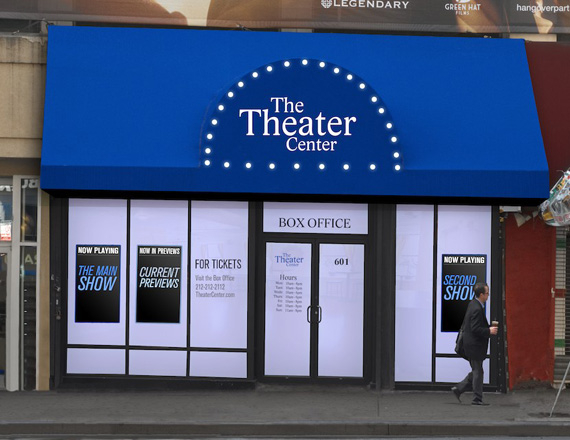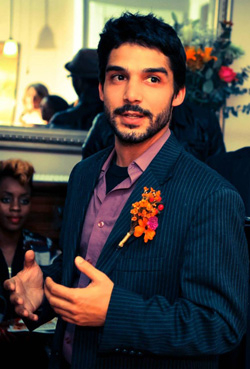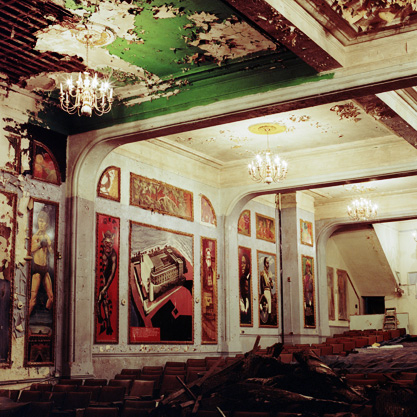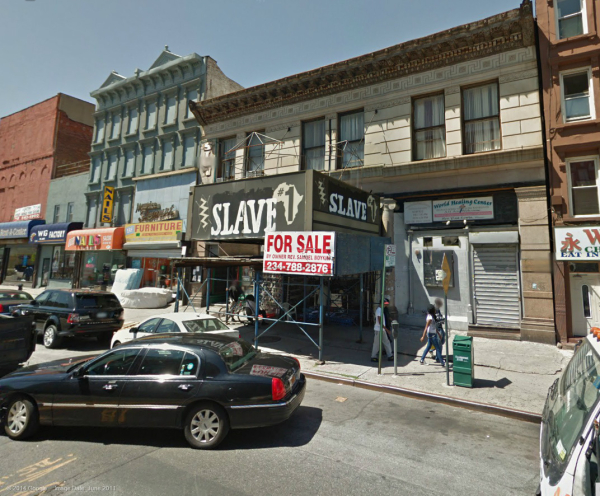Real Estate Drama: The Trials and Tribulations of Building New Theaters in New York City
Catherine Russell and Jonathan Solari both want to build new theaters in the Big Apple, but they have very different ideas about how to do it.

(Courtesy of Catherine Russell)
Space is the most precious commodity in New York City. With an average population density of just over 27,000 people per square mile (according to the census), property values and rents are among the highest in the world. This makes theater, an already notoriously unpredictable business, an even more difficult proposition. How can theater continue to thrive in this city so defined by the stage if producers are increasingly priced out? Catherine Russell has a solution.
Russell is the general manager of the Snapple Theater Center, the two-stage complex at West 50th Street and Broadway currently housing a revival of The Fantasticks and the long-running murder mystery Perfect Crime (in which Russell has starred for nearly 11,000 performances). Russell broke new ground when she sold the naming rights of her newly renovated performance space to the celebrated beverage company. Now she’s now looking to expand her empire south, to a new complex at 601 8th Avenue. Built in 1935, the nondescript low-rise building at the corner of West 39th Street and 8th Avenue is currently occupied by a number of tiny storefronts and fast-food joints, which are ubiquitous in the shady-lady part of the 30s just south of the Port Authority bus terminal. “I’m always looking for space, to be honest with you,” the indefatigable actress/producer/real estate developer told me over the phone after she finished teaching a class at Baruch College. “I want to build a couple more.” (Indefatigable.)

(Courtesy of Catherine Russell)
The new space, tentatively called “The Theater Center,” will house three stages and a restaurant. And yes, naming rights are on the table. “I’m really committed to providing theaters that producers can afford,” Russell said about her motivation to create more space for for-profit Off-Broadway. Commercial producers don’t have a subscription base like many not-for-profits, so Russell believes that the theaters need to be in neighborhoods regularly frequented by tourists, like midtown. As always, the three most important considerations in real estate are location, location, location.
For Russell (who is also a producer on The Fantasticks), it is much easier to get people to invest their money in a theater complex located between the bus terminal and Penn Station than it is to raise capital for an actual show. “They’re absolutely going to get it back,” she confidently stated about her investors. She elaborated: “The Shuberts and the Nederlanders are the only people who consistently make money in theater because they control the buildings. If you control the buildings, you have all the money and you give the producers money in the settlements at the end of the week. Once people grasp that, I’m very comfortable asking them for money.”
Russell firmly believes that commercial Off-Broadway needs a new direction if it is going to survive in New York. “You can’t use the Broadway-light model.” Yet for her, that path doesn’t come with a 501(c)(3), the tax filing status for not-for-profits. “My heart is really with commercial Off-Broadway,” she said, also speaking for her business partner, Tony winner Hugh Hysell (Vanya and Sonia and Masha and Spike). “Hugh and I wouldn’t say no to a resident company if the price is right, but both of us feel like we really want to see commercial Off-Broadway have more options.”

(© Sarah Wolff)
A twenty-minute A-train ride away, producer/director Jonathan Solari is planning his own theater complex in the Bedford-Stuyvesant neighborhood of Brooklyn, a place where tourists rarely tread. He has a different strategy. Solari wants to turn the shuttered theater at 1215 Fulton Avenue into a three-stage performance space to be shared by several nomadic Brooklyn theater troupes and his own not-for-profit company, New Brooklyn Theater.
The theater at 1215 Fulton Avenue opened in 1910 as the Regent Theater. Community activist Judge John Phillips purchased the Regent in 1984 and renamed it the Slave Theater. It became a meeting place for black activists, including Rev. Al Sharpton. The theater was closed down in 1998 and put up for sale in 2008 following Phillips’ death. Solari had been fascinated by the theater ever since he moved to the neighborhood in 2007, and he thought it would be the perfect space to produce a friend’s play.
“There were several for-sale signs outside the theater with different phone numbers,” Solari recalled. “So I called one of the numbers and said, ‘I’m curious as to how we can get into this building to perform a play.’ The reply was that I should just buy it. So I thought about it and a few hours later I said, ‘All right. We’ll go for that.'” Solari began a dramatic campaign to raise funds to buy the theater at auction, but a local developer, Fulton-Halsey Development Group, purchased the building outright before it ever went on the block.
A lawyer for the Bank of New York tipped off Solari to the purchase before it became public. “I hung up and ran to [Fulton-Halsey’s] office,” Solari recounted. “I walked in and said, ‘I need to speak with someone about the Slave Theater.'” Solari implored the developer to maintain a theater at 1215 Fulton as a goodwill gesture to the neighborhood. They agreed. While it’s not yet clear if the building will be developed for residential or commercial space, there will be a theater at 1215 Fulton Avenue. “We’ve sat down with their architects,” Solari said. “Every option includes a permanent home for New Brooklyn Theater that we will own and operate.”

(Courtesy of Jonathan Solari)
While Solari wants to produce his own company’s shows in that theater, he’s also interested in hosting co-productions and rentals for fledgling Brooklyn theater troupes. “The idea of creating New Brooklyn Theater was to become a solution to a problem,” he explained, “not continue the skyrocketing rents that are forcing young companies to fold prematurely.” Of course, these are all still ideas that have not come to fruition and won’t until the owner of the building begins construction.
Until then, New Brooklyn Theater remains nomadic. Their most recent home is the troubled Interfaith Medical Center, a Brooklyn Hospital on the brink of closure, where Solari is currently staging a production of Edward Albee’s The Death of Bessie Smith. Albee’s play tells the story of how the legendary blues singer was denied care at a whites-only hospital in 1937 Memphis. The medical center has been highlighted in recent days by Mayor Bill de Blasio and Public Advocate Letitia James as an example of New York City’s healthcare infrastructure, highlighting the way hospital service is increasingly inaccessible to poor New Yorkers. On January 17, just hours before curtain, the hospital was occupied by protestors demanding that ambulance service be reinstated after chief executive Patrick Sullivan ordered it suspended.
By inserting himself and his company into the drama of local politics, Solari is positioning his theater as something essential to the community. “Regardless of opening up a permanent home or continuing to produce nomadically throughout Bed-Stuy, we have an obligation to our audience to speak to the issues they’re facing,” he reflected. The initial run of the show sold out and has been extended through February 9.
Solari and Russell have very different ideas about how to foster new theater, but they both agree that it can’t happen without navigating the complex and often dramatic world of New York City real estate.

(© Google)









